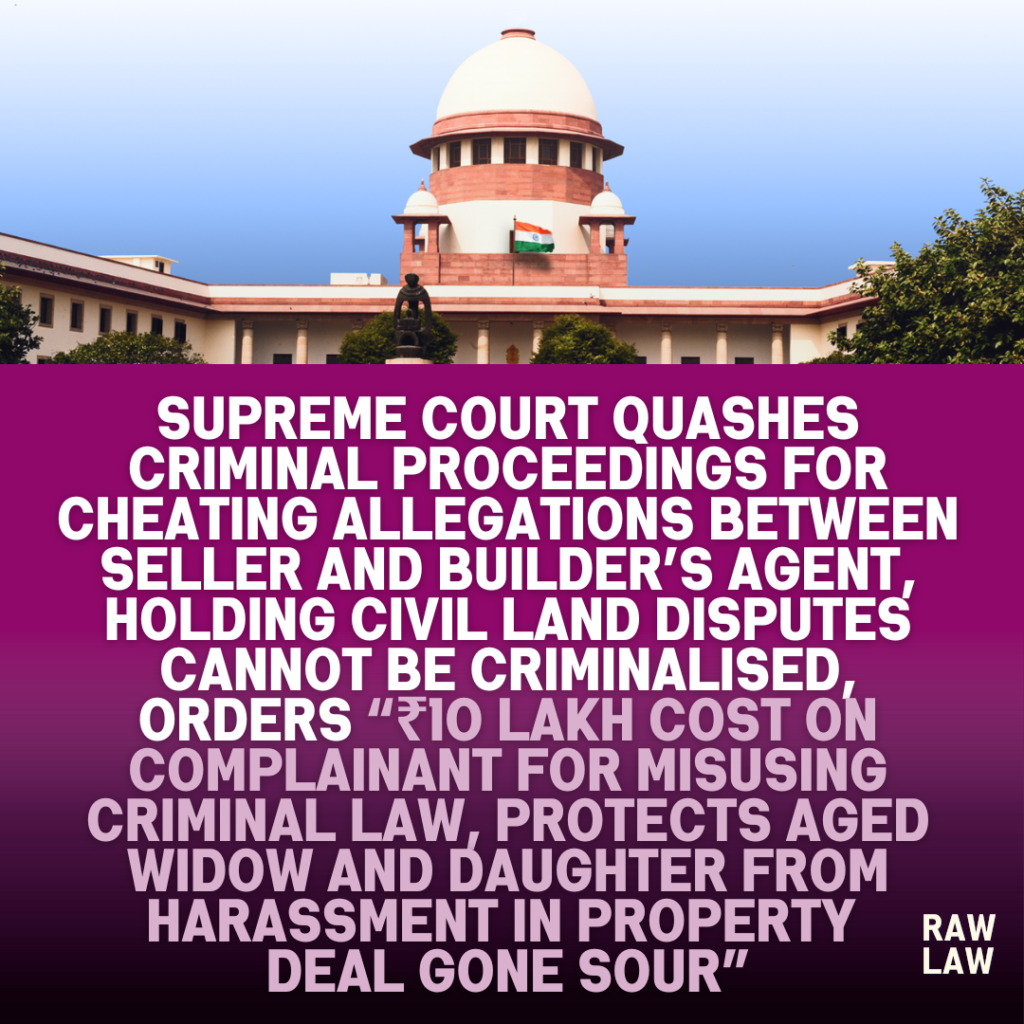Court’s Decision
The Supreme Court allowed the appeal filed by two women, a seventy-year-old widow of a retired Army officer and her daughter, quashing the First Information Report and criminal proceedings for cheating and criminal breach of trust under Sections 406 and 420 of the Indian Penal Code. The Court held the dispute to be purely civil in nature, arising from a land sale transaction, and criticized the misuse of criminal proceedings to pressurize the appellants. The Court imposed ₹10 lakh cost on the complainant for abusing legal process and granted police protection to the appellants whenever they visit Telangana for property management.
Facts
The appellants, residents of New Delhi, entered into an oral agreement to sell a 500 square yard land in Hyderabad to the complainant, a builder’s agent, for ₹5.75 crores with staged price increases depending on payment deadlines. ₹4.05 crores was paid through bank transfers, with a disputed claim of ₹75 lakhs paid in cash. When the sale deed was not executed, the complainant filed both a civil suit for specific performance and a criminal complaint alleging cheating, leading to the arrest of the 70-year-old appellant, who was kept in custody for eight days.
Issues
- Whether the criminal proceedings for cheating and criminal breach of trust were an abuse of process in a purely civil land dispute.
- Whether the High Court erred in dismissing the quashing petition without examining the merits.
- Whether criminal law was improperly used to pressure the appellants into settling a civil land dispute.
Petitioner’s Arguments
The appellants argued that the transaction was a straightforward civil dispute over an oral sale agreement of land, already subject to a civil suit for specific performance. They contended that the complainant exaggerated allegations, included unrelated properties, and misused police powers to harass them, resulting in illegal detention of a senior citizen. They relied on Supreme Court precedents disapproving criminalisation of civil disputes and highlighted their offer to return the money to avoid prolonged litigation.
Respondent’s Arguments
The State and complainant opposed the appeal, alleging the appellants fraudulently induced the complainant to part with substantial amounts under false promises of selling their land and an adjacent property. They argued that the complaint disclosed ingredients of cheating, that dishonest intent existed from the outset, and justified continuation of criminal proceedings.
Analysis of the Law
The Court reviewed the FIR, civil suit pleadings, and surrounding circumstances, finding glaring inconsistencies in the complainant’s claims. Relying on established precedents, the Court reiterated that criminal law should not be invoked in purely contractual disputes involving property transactions, where the complaint’s primary grievance is non-execution of a sale deed. It emphasized that a private property dispute should be pursued through civil litigation and condemned criminal proceedings designed to coerce property owners.
Precedent Analysis
The Court referred to Rikhab Birani (2025), Paramjeet Batra (2013), Sachin Garg (2024), A.M. Mohan (2024), and Lalit Chaturvedi (2024), where it was held that civil disputes should not be allowed to be dressed up as criminal cases and that the criminal process cannot be misused to settle civil claims. These precedents supported the conclusion that the FIR was an abuse of process.
Court’s Reasoning
The Court reasoned that inconsistencies between the FIR and civil suit indicated manipulation of facts by the complainant. It condemned the complainant’s conduct in criminalising a civil dispute and the coercive tactics resulting in unjustified detention of an elderly woman. The Court found the High Court’s summary dismissal of the quashing petition erroneous and intervened under Article 136 to prevent miscarriage of justice.
Conclusion
The Supreme Court quashed the FIR and all criminal proceedings, imposed ₹10 lakh costs on the complainant for abuse of process, and directed police protection for the appellants. It reinforced the principle that civil disputes, especially involving sale of immovable property, must not be converted into criminal proceedings to harass the seller.
Implications
This judgment reaffirms safeguards against misuse of criminal law in civil disputes, especially in property transactions, and strengthens protection against harassment of elderly litigants. It establishes deterrence against filing of false criminal cases to coerce settlement in land dealings.
Referred Judgments Summary
- Rikhab Birani (2025), Sachin Garg (2024), A.M. Mohan (2024), Lalit Chaturvedi (2024): Criminal law cannot be used for civil disputes.
- Paramjeet Batra (2013): Contractual breaches without fraudulent intent do not constitute criminal offences.
FAQs
1. Can criminal charges be filed in land sale disputes involving oral agreements?
No, civil disputes arising from sale agreements must be settled through civil courts, and invoking criminal charges is an abuse of process.
2. What protection does the Court offer to sellers in such disputes?
The Court quashed proceedings and granted police protection to prevent harassment of the appellants by the complainant.
3. What is the consequence of filing false criminal cases in civil matters?
The Supreme Court imposed ₹10 lakh costs on the complainant, sending a clear message against misuse of criminal proceedings.



